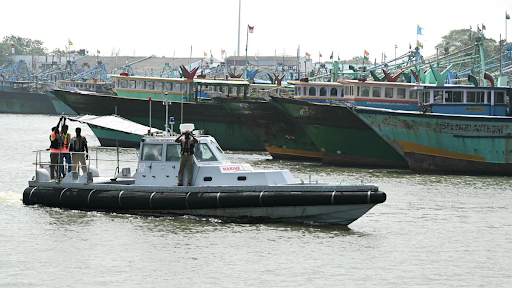




Source: INDIANEXPRESS
Disclaimer: Copyright infringement not intended.
In the aftermath of the Pahalgam terror attack India’s Directorate General of Shipping issued a ban on the entry of Pakistan-flagged ships into Indian ports under Section 411 of the Merchant Shipping Act, 1958.
Pakistan reciprocated with a similar ban on Indian-flagged ships.
A ship’s flag indicates the country of registration or the flag state not necessarily the owner’s or crew’s nationality.
According to the International Maritime Organization a ship’s registration links it to a state which exercises jurisdiction over it.
|
Function |
Explanation |
|
Legal Jurisdiction |
The flag state has the right and duty to exercise control over the ship under international law. |
|
Safety and Standards |
The flag state enforces compliance with international standards like safety, environmental protection, and labor laws. |
|
Nationality |
Grants nationality to the vessel; the ship is considered an extension of the territory of the flag state. |
|
Crew Protection |
In case of accidents or disputes, legal remedies are provided under the flag state's laws. |
Merchant Shipping Act, 1958 (India)
Applies to Indian-flagged ships globally and foreign-flagged ships in Indian waters.
Ensures safety of ships and lives at sea.
UNCLOS (1982)
Requires a genuine link between ship and state.
However it does not define what constitutes a genuine link, leading to loopholes and flag of convenience practices.
|
Registry Type |
Characteristics |
|
Closed Registry |
Only allows ships owned/operated by nationals or companies of that country. (e.g., India) |
|
Open Registry |
Allows foreign ships to register, often with minimal requirements. Popular for cost-saving. |
|
Hybrid or Second Registries |
Conditional flexibility (e.g., national registry for coastal trade, open for foreign trade). |
When a ship registers in a country for economic or legal benefits, even if it has no real ties to that country.
Benefits to Shipowners
Lower taxes
Lenient labor and environmental laws
Reduced operational costs
Quicker registration process
|
Country |
Reasons for Popularity |
|
Panama |
Low taxes, no minimum crew nationality, quick registration |
|
Liberia |
Streamlined digital registry, tax incentives |
|
Marshall Islands |
High-quality shipping standards, U.S. affiliation |
|
Others |
Hong Kong, Singapore, China, Malta, Bahamas |
|
Concern |
Example/Impact |
|
Poor Oversight |
Lax safety inspections and poor labor conditions on FoC ships |
|
Fraudulent Registrations |
DRC reported 73 vessels fraudulently using its flag for illegal fishing (2017) |
|
Environmental Risk |
Easier for polluting ships to escape consequences |
|
Maritime Security |
Difficult to trace ownership in case of smuggling or terrorism |
Sources:
|
PRACTICE QUESTION Q. Under which legal provision did India ban Pakistan-flagged ships from entering its ports? A. Article 21 of the Indian Constitution Answer: C Explanation: The ban was issued under Section 411 of the Merchant Shipping Act 1958 which deals with control over foreign ships in Indian waters in special circumstances. |






© 2026 iasgyan. All right reserved